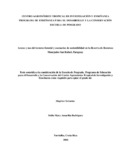| dc.contributor.author | Amarilla Rodríguez, Stella M. | es_ES |
| dc.contributor.other | CATIE - Centro Agronómico Tropical de Investigación y Enseñanza | |
| dc.coverage.spatial | Turrialba, Costa Rica | |
| dc.date.accessioned | 2014-10-20T03:58:52Z | |
| dc.date.available | 2014-10-20T03:58:52Z | |
| dc.date.issued | 2004 | es_ES |
| dc.identifier | 366615 | es_ES |
| dc.identifier.uri | https://repositorio.catie.ac.cr/handle/11554/4374 | |
| dc.description | Tesis (Mag. Sc.) -- CATIE, 2004 | es_ES |
| dc.description | 185 páginas | |
| dc.description | 42 ilustraciones, 18 tablas | |
| dc.description | 37 referencias | |
| dc.description.abstract | El estudio identificó y caracterizó a los principales actores claves de la reserva y a las instituciones con el fin de establecer posibles escenarios de sostenibilidad. A través de la teoría de juegos se analizó el comportamiento actual de estos actores cuyas decisiones tienden actualmente hacia la degradación de los recursos. Cada grupo analizado (indígenas, campesinos, propietarios e instituciones) decide actualmente pensando en sus propios beneficios, cuyo resultado los ubica en un equilibrio individual o equilibrio de Nash, sin embargo los posibles escenarios de sostenibilidad propuestos para la reserva apuntan a un equilibrio social que incluye los beneficios para los demás actores de la sociedad. Para alcanzar los escenarios de sostenibilidad se plantearon algunas regulaciones ambientales como la implementación de incentivos económicos por el uso sostenible de los recursos, la contemplación de un sistema de monitoreo y control en el área y la aplicación de sanciones graduadas para regular la conducta de los actores hacia el equilibrio óptimo social. Además se propusieron medidas cooperativas a nivel de los actores a través de lineamientos de reglas de acceso y uso del bosque tanto a nivel individual de los mismos como a nivel colectivo e institucional. El alcance de un arreglo institucional en la reserva y la consolidación de la institucionalidad rural de los actores constituyen un proceso que no debe ser a largo plazo si se pretende conservar la zona y consolidar la sostenibilidad del área a corto plazo. | es_ES |
| dc.description.abstract | With the objetive to establish possible sustainable scenario, this study identified and characterized the key principal actors in the reserve and the institutions. Using the game theory, the present behavior of these actors, whose decisions have a tendency toward resource degradation, was analyzed. Each group analyzed (indigenous, farmers, land owners, and institutions) makes decisions according to their own benefits. These results locate them in an individual equilibrium or Nash equilibrium; however, the possible sustainability scenarios proposed for the reserve point to a social equilibrium which includes benefits for the rest of the actors in the society. In order to achieve the sustainability scenarios, some environmental regulations were proposed such as implementation of economic incentives for sustainable resource use, the consideration of a monitoring and control system in the area and the application of graduated sanctions to regulate the behavior of the actors toward the optimum social equilibrium. Furthermore, cooperative measures were proposed at the actor level using forest access and use guidelines not only at the individual level but also at the collective and institutional levels. Achieving an institutional arrangement in the reserve and consolidating the rural institutionality of the actors constitutes a process that can not be long-term if its aim is to conserve the zone and assure the sustainability of the area in the short-term. | |
| dc.language.iso | es | es_ES |
| dc.publisher | CATIE - Centro Agronómico Tropical de Investigación y Enseñanza | es_ES |
| dc.relation.ispartof | Maestría en Socioeconomía Ambiental | |
| dc.subject | FOREST RESOURCES | |
| dc.subject | NATURE RESERVES | |
| dc.subject | RESOURCE MANAGEMENT | |
| dc.subject | LAND USE | |
| dc.subject | ENVIRONMENTAL LEGISLATION | |
| dc.subject | ECOLOGY | |
| dc.subject | SUSTAINABILITY | |
| dc.subject | SOCIOECONOMIC ENVIRONMENTRECURSOS FORESTALES | |
| dc.subject | RESERVAS NATURALES | |
| dc.subject | ORDENACION DE RECURSOS | |
| dc.subject | UTILIZACION DE LA TIERRA | |
| dc.subject | LEGISLACION MEDIOAMBIENTAL | |
| dc.subject | ECOLOGIA | |
| dc.subject | SOSTENIBILIDAD | |
| dc.subject | ENTORNO SOCIOECONOMICO | |
| dc.subject | PARAGUAY | |
| dc.title | Acceso y uso del recurso forestal y escenarios de sostenibilidad en la Reserva de Recursos Manejados San Rafael, Paraguay | es_ES |
| dc.title.alternative | Access and use of forest resources and sustainability scenarios in the San Rafael Reserve of Managed Resources, Paraguay | es_EN |
| dc.type | Tesis | es_ES |
| dcterms.rights | acceso abierto | |
| dc.identifier.publication | Turrialba (Costa Rica) | es_ES |
| dc.status | info:eu-repo/semantics/openAccess | |


